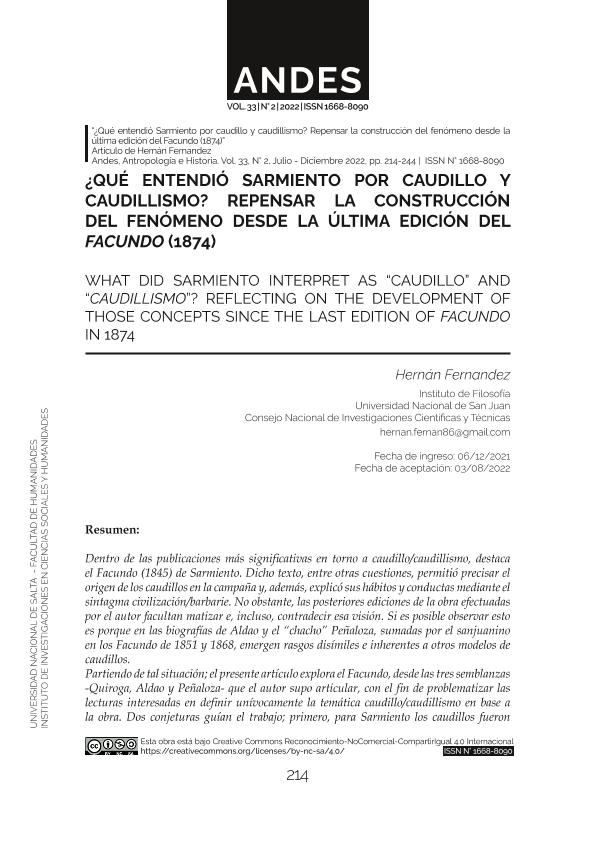Mostrar el registro sencillo del ítem
dc.contributor.author
Fernandez, Gabriel Hernán

dc.date.available
2023-10-24T14:55:28Z
dc.date.issued
2022-11
dc.identifier.citation
Fernandez, Gabriel Hernán; ¿Qué entendió Sarmiento por caudillo y caudillismo?: Repensar la construcción del fenómeno desde la última edición del Facundo (1874); Universidad Nacional de Salta. Centro Promocional de las Investigaciones en Historia y Antropología; Andes; 33; 2; 11-2022; 1-31
dc.identifier.issn
0327-1676
dc.identifier.uri
http://hdl.handle.net/11336/215751
dc.description.abstract
Dentro de las publicaciones más significativas en torno a caudillo/caudillismo, destaca el Facundo (1845) de Sarmiento. Dicho texto, entre otras cuestiones, permitió precisar el origen de los caudillos en la campaña y, además, explicó sus hábitos y conductas mediante el sintagma civilización/barbarie. No obstante, las posteriores ediciones de la obra efectuadas por el autor facultan matizar e, incluso, contradecir esa visión. Si es posible observar esto es porque en las biografías de Aldao y el “chacho” Peñaloza, sumadas por el sanjuanino en los Facundo de 1851 y 1868, emergen rasgos disímiles e inherentes a otros modelos de caudillos.Partiendo de tal situación; el presente artículo explora el Facundo, desde las tres semblanzas -Quiroga, Aldao y Peñaloza- que el autor supo articular, con el fin de problematizar las lecturas interesadas en definir unívocamente la temática caudillo/caudillismo en base a la obra. Dos conjeturas guían el trabajo; primero, para Sarmiento los caudillos fueron un fenómeno multiforme. Segundo, el interés del sanjuanino por describir el caudillismo radicó finalmente en la búsqueda por diagramar determinado campo político, juzgado necesario para su proyectado modelo de república.
dc.description.abstract
Facundo (1845) by Sarmiento is acknowledged as one of the most meaningful pieces of literature related to the concepts of “caudillo” / “caudillismo”. That text, among other issues, allowed tracing the origin of the “caudillos” in the campaigns as well as defining their habits and behavior by means of the syntagm “civilization/ barbarity”. Nevertheless, the following editions produced by the author of that literature piece enabled to soften, or even disagree with, that perspective. This is evident because the additions of the biographies of Aldao and “Chacho” Peñaloza in the editions of Facundo (1851) and Facundo (1868) include dissimilar features and characteristics inherent to other models of “caudillos”. Taking into consideration that situation, this paper explores Facundo from the three biographical notes the author articulated -Quiroga, Aldao and Peñaloza- with the aim of questioning the reading interested in defining, unequivocally, the topic of “caudillo”/“caudillismo”. This paper is outlined by two conjectures: first, according to Sarmiento, the “caudillo” was a multiform phenomenon. Second, Sarmiento´s interest in describing “caudillismo” finally consisted in the search for diagraming a specific political context he considered necessary for his model of republic.
dc.format
application/pdf
dc.language.iso
spa
dc.publisher
Universidad Nacional de Salta. Centro Promocional de las Investigaciones en Historia y Antropología

dc.rights
info:eu-repo/semantics/openAccess
dc.rights.uri
https://creativecommons.org/licenses/by-nc-sa/2.5/ar/
dc.subject
Sarmiento
dc.subject
Facundo
dc.subject
caudillismo
dc.subject
caudillos
dc.subject.classification
Historia

dc.subject.classification
Historia y Arqueología

dc.subject.classification
HUMANIDADES

dc.title
¿Qué entendió Sarmiento por caudillo y caudillismo?: Repensar la construcción del fenómeno desde la última edición del Facundo (1874)
dc.title
What did sarmiento interpret as “caudillo” and “caudillismo”?: Reflecting on the development of those concepts since the last edition of facundo in 1874
dc.type
info:eu-repo/semantics/article
dc.type
info:ar-repo/semantics/artículo
dc.type
info:eu-repo/semantics/publishedVersion
dc.date.updated
2023-10-10T13:08:12Z
dc.identifier.eissn
1668-8090
dc.journal.volume
33
dc.journal.number
2
dc.journal.pagination
1-31
dc.journal.pais
Argentina

dc.journal.ciudad
Salta
dc.description.fil
Fil: Fernandez, Gabriel Hernán. Universidad Nacional de San Juan. Facultad de Filosofía, Humanidades y Artes. Instituto de Filosofía; Argentina. Consejo Nacional de Investigaciones Científicas y Técnicas. Centro Científico Tecnológico Conicet - San Juan; Argentina
dc.journal.title
Andes

dc.relation.alternativeid
info:eu-repo/semantics/altIdentifier/url/https://portalderevistas.unsa.edu.ar/index.php/Andes/article/view/3368
Archivos asociados
